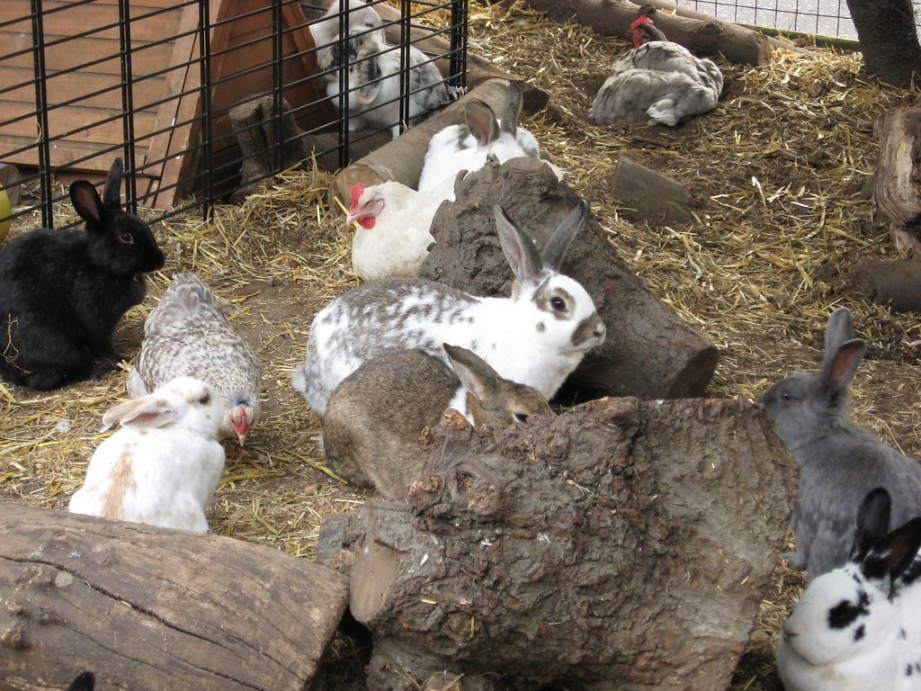Can Chicken And Rabbit Live Together?
Many people who raise backyard animals often wonder if it is possible for chickens and rabbits to coexist peacefully. Both animals can be kept for various reasons, such as meat, eggs, or as pets. However, it is essential to consider several factors before deciding to house these two species together. In this article, we will explore whether chickens and rabbits can live harmoniously and provide some guidance on how to ensure their well-being.

Factors to Consider
When considering cohabitation between chickens and rabbits, it is crucial to keep the following factors in mind:
- Space: Both chickens and rabbits require adequate space to move around comfortably. Ensure that the enclosure is spacious enough to accommodate both species and provide separate areas for each.
- Protection: Rabbits are generally more vulnerable to predators compared to chickens. It is crucial to have a secure enclosure that protects both species from potential harm.
- Feeding Requirements: Chickens and rabbits have different dietary needs. It is essential to understand their nutritional requirements and ensure they receive appropriate food.
- Behavior: Chickens tend to be more inquisitive and active, while rabbits are generally more reserved and territorial. Their differing behaviors could potentially lead to conflicts.
- Compatibility: Some chickens and rabbits may get along well, while others may not. It is important to introduce them gradually and monitor their interactions closely.
Possible Challenges
Introducing chickens and rabbits can present a variety of challenges:
- Territorial Issues: Rabbits are territorial animals and may view chickens as intruders. This can lead to aggressive behavior, such as chasing, biting, or scratching.
- Food Competition: Chickens and rabbits have different dietary needs. If their food is not properly managed, it may lead to food aggression or nutritional imbalances.
- Stress: Chickens and rabbits have different stress triggers. Chickens can be noisy and active, which may stress out rabbits, while rabbits’ sudden movements can frighten chickens.
- Health Concerns: Chickens and rabbits may carry different diseases and parasites. If not properly maintained and monitored, they can pass infections to each other.
Tips for Successful Cohabitation
While there are challenges to consider, with proper planning and care, chickens and rabbits can live together harmoniously. Here are some tips to help ensure successful cohabitation:
- Gradual Introduction: Introduce the animals gradually, allowing them to become familiar with each other’s presence. Start by keeping them in separate enclosures within sight of one another before eventually allowing supervised interactions.
- Provide Separate Spaces: Each species should have their own designated areas within the enclosure. This will allow them to retreat to their own territory if needed and minimize conflicts.
- Secure Enclosure: Ensure the enclosure is predator-proof and provides sufficient protection for both chickens and rabbits. This will help prevent potential harm and reduce stress levels.
- Supervise Interactions: Regularly monitor the animals’ interactions to ensure they are getting along well. If any signs of aggression or stress are observed, it may be necessary to separate them.
- Proper Nutrition: Provide appropriate food for each species and ensure they have access to their own feeders and water sources. This will prevent food competition and help maintain their health.
FAQs
1. Can chickens and rabbits share the same coop?
No, it is not recommended for chickens and rabbits to share the same coop. Chickens might peck or harass rabbits, causing stress and potential harm. It is best to provide separate enclosures for each species within the same area.
2. Can chickens and rabbits eat the same food?
While there may be some overlap in their diets, it is essential to provide species-specific food to ensure proper nutrition. Chickens require higher protein content, while rabbits need more fiber. Consult with a veterinarian or animal nutritionist to determine the best feeding plan for both species.
3. How can I prevent aggression between chickens and rabbits?
Aggression can be minimized by gradually introducing the animals, providing separate spaces within the enclosure, and closely monitoring their interactions. If aggression persists, it may be necessary to separate them permanently to ensure their well-being.
4. What are the signs of stress or conflict between chickens and rabbits?
Signs of stress or conflict include excessive chasing, biting, scratching, feather plucking, excessive hiding, decreased appetite, weight loss, or changes in behavior. If any of these signs are observed, it is important to intervene and separate the animals if necessary.
In conclusion, while it is possible for chickens and rabbits to live together, it requires careful consideration of their specific needs and behaviors. By providing adequate space, separate areas, proper nutrition, and continuous monitoring, successful cohabitation can be achieved. Always prioritize the well-being and safety of both species to ensure a harmonious living environment.
Related Articles…
Copyright Notice:
All images featured on this site are sourced from the internet, copyrights belong to respective owners. Should you own any image and require it to be removed, please contact us.